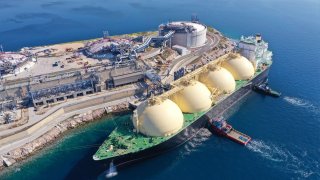Increasing LNG Permits Is Critical to Sanctioning Russia
Vladimir Putin’s long-standing opposition to U.S. natural gas highlights its strategic value—powering our allies to allow them to reduce dependency on Russian LNG.
When Russia invaded Ukraine nearly two years ago, American liquefied natural gas (LNG) exporters emerged as critical players in safeguarding global energy security. By replacing Russian energy previously sent to Europe via pipeline, American LNG buffered Europe against a full-blown crisis and fortified the West’s united support for Ukraine and our NATO allies. Despite this success, many of our allies are still importing millions of dollars’ worth of Russian LNG every day. Obviously, they would rather not rely on Russia, but they need the U.S. LNG industry to rapidly expand its export capacity first—if President Biden allows for it.
Last month, the Biden administration took aim at its own domestic energy export capabilities by halting all permits for new LNG projects—effectively banning future exports. This came in sharp contrast to the administration’s recent sanctions on shipments of Russian gas from the Arctic LNG 2 terminal. While our allies have already pledged to reduce their Russian gas dependency, this shift hinged on the United States’ ability to promptly supply their alternative.
Japan, the world’s leading LNG importer, which was already in a precarious position due to its reliance on anticipated supplies from Russia’s sanctioned Arctic LNG 2, is now facing an all-out energy crisis. Top Japanese power generator JERA said they expect the suspension “could affect the LNG security not only for us, but also for Japan and the world.”
Our allies have cause for concern over President Biden’s LNG moratorium, especially at a time when exporters want to add fifty percent capacity by 2026 to meet global demand. The Department of Energy (DOE) and the Federal Energy Regulatory Commission (FERC) under President Biden have been notoriously slow in processing permits for LNG exporters—setting the stage for this moratorium. The current eleven-month average processing time under Biden contrasts sharply with the seven-week time frame under the Trump administration and even the six-month duration under Obama.
The LNG moratorium reflects the influence of radical climate ideologues within the administration who would rather see President Biden dismantle all fossil fuel industries regardless of the disastrous geopolitical—and ironically environmental—consequences. For example, the White House Environmental Justice Council (WHEJAC) hasn’t budged on its zero-tolerance approach to fossil fuels, even condemning the President because he “asked the CEOs of fossil fuel companies to increase production” after Russia invaded Ukraine.
When defending the reasoning behind the “pause,” DOE said it wanted to evaluate the true global demand for LNG. This bizarre “central planning” does not comport with the realities of the rapidly expanding global energy market. The reality is that the market will determine what demand is, and it already has by signing contracts with many U.S. suppliers. For example, LNG industry newcomer Venture Global has inked long-term deals with four of this year’s top five Russian LNG importers: China, Japan, Spain, France, and the United Kingdom. The company has signed numerous deals since Russia invaded Ukraine, including with two Japanese companies that have signed twenty-year supply agreements for a combined two million tons per year from CP2, matching its yearly allocation from Arctic Pass 2, negotiated years before the Ukraine invasion. This is just one company alone—clearly, the demand for U.S. LNG is surging.
The administration’s second line of defense for the “pause” is examining whether U.S. LNG exports are impacting domestic prices. The data demonstrates that exports are not impacting domestic prices. The price of natural gas in the U.S. is nearly at an all-time low, currently under $2/MMBtu. The reason? LNG exports are spurring upstream production and creating jobs along the way. This is a good thing for our domestic prices and the economy. The biggest threat to domestic prices is the lack of pipeline infrastructure in the United States, a problem that the same people behind this bad LNG policy have caused.
Halting LNG permitting not only undermines the security of countries depending on these future shipments, but it also would likely send LNG prices soaring, leading to windfall profits for the Kremlin’s war chest. Such a move could force allies to revert to Russian gas or less eco-friendly energy sources like Chinese coal, adversely affecting global decarbonization efforts. Intensified pressure in the coal market could also significantly impact the prices of solar, wind, and batteries, as their supply chains heavily rely on it.
Perhaps most critically, restricting LNG exports would certainly elevate pressure on Kyiv to surrender its fight to liberate the large chunk of its country currently occupied by Russian forces. It would be a massive betrayal to the Ukrainians who have sacrificed so much for the West.
Putin’s long-standing opposition to U.S. natural gas highlights its strategic value—powering our allies to allow them to reduce dependency on Russian LNG. The current geopolitical climate is not the time for playing politics to appease the radical left; it’s a time for decisive action. The United States must respond by imposing stricter sanctions on Russian energy and expediting its own LNG exports, not undermining its own domestic suppliers. This approach is not just about energy; it’s about supporting global stability, aiding our allies, and standing firm against adversaries.
James “Spider” Marks is a retired U.S. Army major general and strategic adviser to the GAIN Coalition.
Image: Shutterstock.com.

